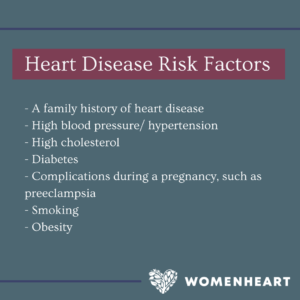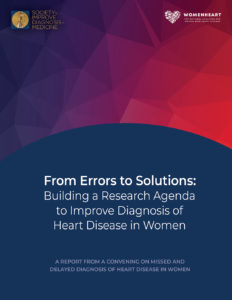Even in 2022, despite years of women’s health advocacy, women’s health issues are often overlooked or dismissed. Heart disease, for example, is the leading cause of death for women in the United States, yet women are often dismissed by doctors when they bring up their concerns. Women of color, who face higher rates of heart disease and other health disparities and are more likely to be diagnosed later in their disease course, face even more challenges advocating for their health.
Whether we like it or not, women need to be our own advocates when it comes to our health. You know your body better than anyone else, and speaking up and demanding answers when something feels off can save your life. WomenHeart Champion Kynata Cope did this shortly after giving birth and saved her own life by insisting on answers after multiple ER visits had resulted in misdiagnosis. If you have a family history of heart disease or have previously experienced symptoms, it’s especially important to be vigilant. Having access to information increases your confidence when you have to speak with health care professionals. When you begin to advocate for yourself, you can make sure that you get the care and attention you deserve.
It is important to know:
 ♥️ The top risk factors for heart disease in women
♥️ The top risk factors for heart disease in women
Telling your health care provider which of the risk factors for heart disease apply to you can help them understand your health better if you ever develop symptoms.
♥️ The symptoms of heart disease in women
Knowing the symptoms of heart disease for women can help you talk with your medical provider as soon as something seems off. While there are many types of heart disease, there are several common symptoms that women often experience, including:
- Shortness of breath
- Fatigue
- Chest pain or discomfort
- Irregular heartbeat
- Nausea
- Dizziness
- Cold sweats
♥️ How to communicate with your health care provider
When it’s time for an appointment – whether you’re on a journey to diagnosis or you’ve already been diagnosed with heart disease – it helps to be prepared, if possible. Have a list of questions you want answers to (here are some ideas); come with a written list or log of the symptoms you’ve been experiencing so you don’t have to recall them on the spot; and know what types of diagnostic tests are available so you can talk about them if you feel that you’re not getting answers that make sense for your health and what you’re experiencing.
Tips for Advocating for Yourself
 While women are just as likely as men to experience heart disease, they are often underdiagnosed and undertreated. WomenHeart convened experts to start developing solutions to this problem and to lift up stories of women who had a missed or delayed diagnosis of heart disease. You can learn more from the report and hear some of the women’s stories.
While women are just as likely as men to experience heart disease, they are often underdiagnosed and undertreated. WomenHeart convened experts to start developing solutions to this problem and to lift up stories of women who had a missed or delayed diagnosis of heart disease. You can learn more from the report and hear some of the women’s stories.
We know that advocating for yourself is often easier said than done. When you’re feeling at your worst, it can be hard to summon the energy to speak up or challenge what you are being told. That’s why it is essential to have a plan in place for when those times come. In addition to being informed about heart disease in women, you can:
- Keep track of your health history and test results to identify any changes or red flags. Many smartphones today come with built-in health apps that allow you to track your important health data all in one place, including your resting and active heart rate, menstrual flow, sleep patterns, and more.
- Be aware of your family members’ experiences with heart disease. You are more at risk of heart disease if others in your family had heart disease.
- Be assertive and clear about your symptoms, concerns, and treatment preferences. If you don’t feel like you’re being heard, don’t hesitate to seek a second opinion.
- Make sure your loved ones know how to spot the signs and symptoms of a heart attack in women, which can differ from those in men.
- And remember, it’s okay to ask for help when you need it. You don’t have to go through this alone. If you are a woman with heart disease, seek out support from your peers, women who have gone through the same thing.
Prioritizing Health Advocacy for Women
As women’s health advocates, WomenHeart works to raise awareness of heart disease in women. Our goal is to encourage women living with or at risk of heart disease to be advocates for their own health by maintaining regular visits with their providers and being aware of their family history.
Only by working together, advocating for ourselves and each other, and raising awareness about women’s health can we hope to improve women’s heart health.




